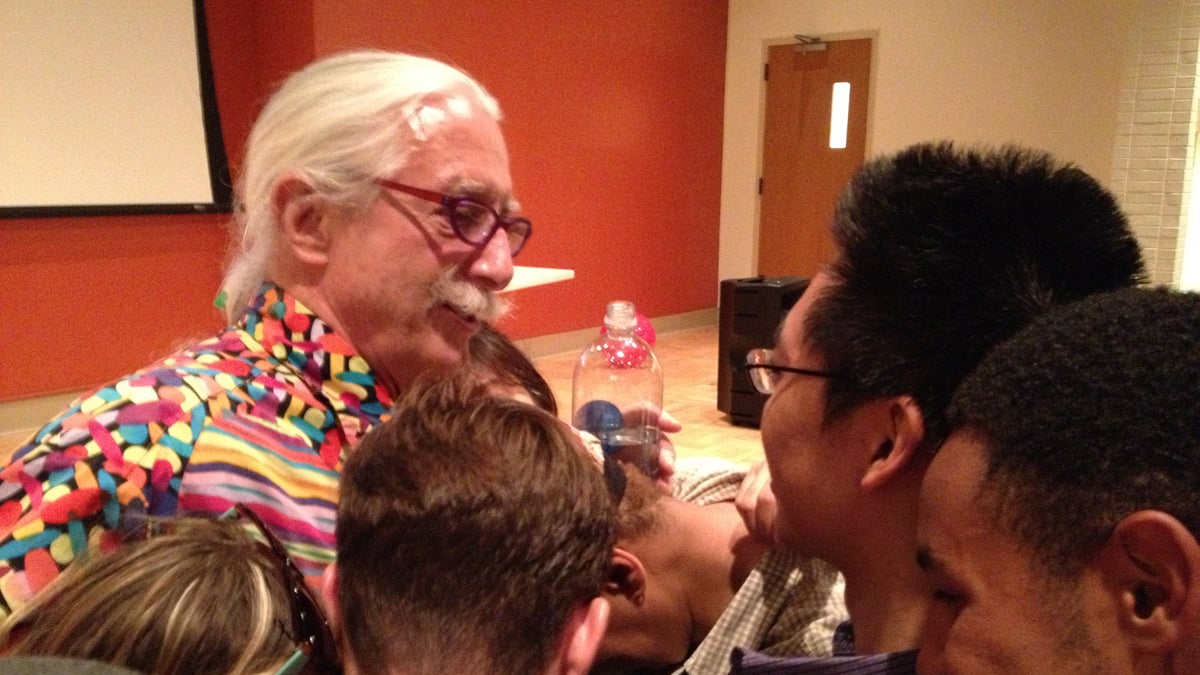‘Medicash’ would be currency of health care co-op

"Patch" Adams joins audience members for a group hug after his speech this week at Drexel College of Medicine. (Taunya English/WHYY)
Doctor—and self-described “weird clown”—Hunter “Patch” Adams was in Philadelphia this week lending his name and energy to a plan to open a health clinic in North Philadelphia.
Adams did not wear the signature red-nose made famous by actor Robin Williams in the1998 bio-film. Still, in front of the audience at the Drexel University Medical College, he did not disappoint.
At different times, the 68-year-old climbed on a chair, yelled like a primate and urged crowd members to pretend they were hugging a tree. He quoted Emily Dickinson convincingly. And sang—loudly—”The Impossible Dream” from musical “Man of La Mancha.”
Local organizers invited Adams to Philadelphia to support their dream of a health center co-op. He said the clinic won’t just be a clinic, but a community, and he said Philly and the world need that.
“Nothing is going well,” Adams said. “We have no legal system, no government, no education, no health care. We don’t take care of people or nature.”
Paul Glover is the on-the-ground visionary who brought Adams and members of his Gesundheit! Institute to town. He said the Patch Adams Clinic in Philadelphia and the fundraising effort will rely “the least” on money and “the most” on the skill and talents of members and volunteers.
Melanie Meltzer said calling the project a “co-op” is a deliberate dodge of some of the red tape and political scrutiny of being an insurance company. “Even though, by practice, it will be basically a kind of insurance company, where people are contributing―likely something like $50 a year,” Meltzer said. “The more people who join the more services we will be able to offer through the clinic.”
The dream includes a clinic that does not hold malpractice insurance and does not accept third-party reimbursement, health insurance.
Those ways of doing health care “destroy the care interaction,” Meltzer said.
Adams said his way of delivering care is threatening to the current health system. Speaking about his decades-long push to build a hospital in West Virginia, Adams said, “We are going to be scary,” if we can deliver modern medical care at 10 percent of the cost.
In addition to the co-op idea, the organizers said they will establish an alternate economy and a fake currency. Co-op members and volunteers would work different jobs to earn the “medicash” Meltzer said, and then that currency would be redeemable at participating local businesses.
Sounds farfetched, but Glover has experience shepherding a similar successful venture, “IthacaHours,” in upstate New York.
The Philadelphia clinic idea is a partnership between Adams’ organization and Glover’s nonprofit organization. Adams has nine clinics around the world. Philadelphia would be the first site in the United States, which, Meltzer admits, has a much more complicated regulatory system.
Philadelphia organizers have their eyes on a 5-acre site in North Philly and are working to build consensus for the idea.
Verna Tyner, president of the neighborhood group Tioga United, said she’s interested in the clinic idea, if not completely convinced.
“A lot of senior citizens live in our community and we have a lot of different brackets of income. Temple University, as you know, is overcrowded … and we need a different quality, a variety of health care.”
Tyner said her community needs an addition that will improve not only health but also job prospects and well-being.
“We definitely would like to see a nice health care center that is fun-loving, that motivates people to come out and not only participate in their health but in other people,” Tyner said.
Meltzer said Adams was in town to push for that kind of community.
“We don’t think that actually addressing people on a physical basis only will fix the health care problems,” she said. “We actually think we have to work on the food issues, the environmental issues, the disparity of wealth issues.”
WHYY is your source for fact-based, in-depth journalism and information. As a nonprofit organization, we rely on financial support from readers like you. Please give today.

